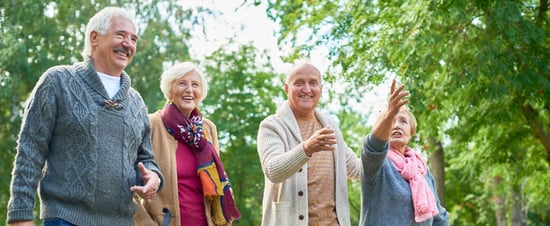How socialization improves the quality of life of aging adults
Walker Methodist | Jan 8, 2019
 In your younger years, chances are you had a fairly wide circle of friends and acquaintances. Whether through school, work, or neighborhood playtime, you probably saw numerous friends come and go over the years.
In your younger years, chances are you had a fairly wide circle of friends and acquaintances. Whether through school, work, or neighborhood playtime, you probably saw numerous friends come and go over the years.
With age comes an ever-shrinking social circle, partly because you meet fewer people on an ongoing basis. But this reduced socialization may be by design. One study revealed that monkeys tended to be more selective about their friends as they aged, and experts believe this may apply to their human counterparts. As you learn and grow, you become more discerning about the people you associate with on a regular basis.
But reduced socialization can actually come at a price for older adults. By getting out there and interacting with your peers on an ongoing basis, you can improve your physical and mental health. Here are a few ways socialization can help you stay healthy as you age.
Improved overall wellbeing
Loneliness and isolation are real issues facing seniors today, having been linked to depression in individuals of all ages. But seniors face a bigger risk of loneliness than other age groups since often they find themselves living alone after the death of a spouse. Interacting with others can give a senior something to look forward to every day while also providing those connections that are so important to overall well-being. Feelings of depression can vastly impact every area of life, often creating more of a sense of isolation. By making an effort to participate in social activities, the risk of depression lessens, increasing quality of life on the whole.
Improved cognitive function
Multiple studies have linked socialization with improved cognitive function, including a recent one that found that seniors who socialized retained their episodic memory better than groups that didn’t. If you can combine your social get-togethers with aerobic exercise, you can boost these benefits further. One study found that aerobic exercise can reduce those instances when you can’t quite find the word you’re trying to say. You’ll also feel happier afterward, thanks to the increase in endorphins that exercise provides. This improved cognitive function can actually aid in the slowing of memory loss, giving you a sharper mind and more positive experiences.
Reduced risk of dementia
Although the jury’s still out on the cause and best course of prevention for dementia, past studies have linked social interaction and reduced risk. One study looked at 593 participants over the course of six years and connected socialization to a reduced likelihood of developing the condition. The study also compared two groups and found those involved in an interactive discussion group showed increased brain volumes. Higher brain volume has been linked to reduced dementia risk.
Better physical health
One by-product of social interaction is often that you’re simply more active. At the very least, you leave the comfort of your favorite chair to have lunch or play games with a group of friends. Ideally, you’re spending that time going for a leisurely walk or taking a yoga class. Physical activity not only bolsters brain health, but it also helps keep you physically active, and physical activity has been linked to a longer life, even in smaller amounts.
Socialization can extend your life. But even better, it can make sure that you make the most of every moment of those extra years. Even if you find small ways to socialize with others, it can make a difference in your overall physical and mental health.
